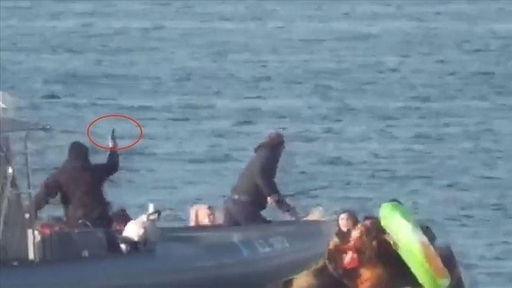Once more on Frontex – Der Spiegel (Giorgos Christides and Steffen Lüdke):
‘The contents of the investigative report from OLAF, the European Union’s anti-fraud agency, are classified. Members of the European Parliament are only granted access under strict security measures, and normal citizens are not allowed to see it. But Margaritis Schinas, the vice president of the European Commission, who is responsible, among other things, for migration, is allowed to. And perhaps he ought to do so as well. At the end of the day, it relates to a sensitive issue that also happens to fall within his area of responsibility.
Investigators have taken 129 pages to document the involvement of Frontex, the EU’s border agency, in the illegal activities of the Greek Coast Guard. Border guards systematically dump asylum-seekers adrift at sea in the Aegean – either in rickety boats or on inflatable life rafts. The investigators reviewed private emails and WhatsApp messages from Fabrice Leggeri, the former head of Frontex, and his team. They interviewed witnesses and seized documents and videos.’ (…)
‘The report from OLAF has the potential to destroy careers. One, that of former border guard agency head Leggeri, is already over . After reading the report from the investigation, Frontex’s board of directors had no choice but to urge him to step down. What investigators have pieced together, though, is so explosive that it reaches far beyond Leggeri. As such, the EU has been trying to keep the report under wraps for months now. However, DER SPIEGEL, Le Monde and Lighthouse Reports have all obtained copies of the report.’
(…)
‘The 129 pages read like an indictment of the Greek government, which still claims it didn’t break any laws. It also creates pressure for Frontex interim director Aija Kalnaja and the European Commission. They will have to act quickly now if they want to remain free of guilt.
A single pushback case does a good job of illustrating almost all of the misdeeds of which OLAF investigators are now accusing Frontex. During the early morning hours of August 5, 2020, the Greek Coast Guard towed an inflatable refugee boat behind it. About 30 refugees had been sitting on the vessel. The Greeks actually should have brought the asylum-seekers safely to shore and provided them with the chance to apply for asylum. Instead, they dragged them back toward Turkey.
Officials at Frontex were able to follow the pushback live. A Frontex aircraft had streamed what was happening back to headquarters in Warsaw. By that point, though, the people at Frontex had long since known what was going to happen. They were familiar with the images of refugees left abandoned in the Aegean Sea, and an internal report had explicitly warned of the Greek pushbacks. One official had noted that the Coast Guard had put the migrants in a situation "that can seriously endanger" their lives. "The repetition of such kind of events (sic) becomes more and more difficult to deal with." The pushbacks posed a "huge reputational risk" to the agency, the official wrote.’
(…)
‘The new Frontex interim head, Aija Kalnaja, would like to get all this behind her as soon as possible. She says the crucial thing is that the border agency never gets into a situation like that again. And yet it already finds itself in a similar predicament: Videos and testimonies show that new pushbacks happen in the Aegean Sea almost every day. And Frontex continues to work closely with the Greek border guards.
Kalnaja has herself stated that she has not read the OLAF report – this despite the fact that the it reveals a whole series of structural problems that don’t have anything to do with Leggeri. For example, it states that Greek border guards apparently place pressure on Frontex officials if they try to report pushbacks, as previously reported by DER SPIEGEL. The Greeks often conceal arriving refugee boats by not recording these "ghost landings" in the corresponding Frontex database.
Under Frontex’s own regulations, Kalnaja would be required to end an operation if there are "serious and persistent violations of fundamental rights." The OLAF report leaves no doubt that this is the case in the Aegean. But Kalnaja isn’t even thinking about withdrawing her officials – in fact, she wants to send more staff to the Aegean. In response to a question from DER SPIEGEL, Frontex management said it "strongly believes" that the agency should strengthen its presence in the country. Greece, Frontex wrote, operates in a "very complex geopolitical environment."’
(…)
‘Home Affairs Commissioner Johansson is politically responsible for Frontex. The social democratic politician will have to live with the fact that the use of force at the EU’s external borders has escalated under her watch. Johansson has publicly called on the Greek government to halt the pushbacks. But that hasn't changed anything. So far, the Commission has balked at calls to cut the funding to Athens. Nor has the Commission initiated any infringement proceedings against Greece.
In Brussels, it is considered an open secret that this could be related to European Commission Vice President Schinas. The Greek politician’s Twitter profile is adorned with his country’s flag. The conservative politician is a member of the same political party as Greek Prime Minister Kyriakos Mitsotakis. When it comes to politically sensitive matters, Schinas isn’t shy about asserting his influence, one insider reports. In a recent interview , Schinas said there was no solid evidence that the Coast Guard conducted pushbacks. He claimed the accusations have been lodged exclusively by "NGOs, the press and the authoritarian regime in Ankara." What the commissioner didn’t mention is the OLAF report, which he has had access to since late February.’
Read the article here.
Some of the people responsible for the criminal conduct of a EU-agency have left, but the Greeks continue with the pushbacks and Frontex appears to haven’t changed either.
I have said it before, south of Munich the values of the EU rapidly disappear.
